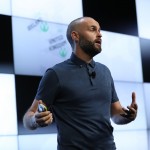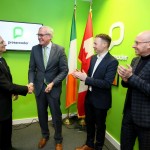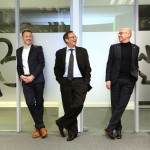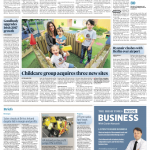This week we speak with Tim Desmond about different aspects of radio production. Tim is a producer with the RTE 1 Radio Show “The Business” broadcast on Sunday mornings from 10am. He has also worked on the Mooney show, the Late Debate and The Marian Finucane. Tim got involved in radio reading news in the pirate station ERI. After that he spent some time as an entrepreneur in the construction industry. Tim really kicked off his media career when he decided to return to college to study Journalism and Social Science in UCC at the age of 38. Tim is a living proof that it’s never too late to become radio producer.
What type of stories interest you for The Business?
We’ve concentrated quite a bit on smaller businesses and start-ups and have become well known for our mentoring series, where start-ups are taken on by successful businesses and we ‘eavesdrop’ on how it all goes. We’ve had big names on as well (Niall Fitzgerald, Edward De Bono, George Soros), they bring a broader view of business which complements the start-up stories. We love locations, the live feel of being out and about is important.
Describe the process when planning the show?
We work ahead with a diary that everyone contributes to. Ideas are bounced around, but only acted on when we’ve given them consideration. We’re not afraid to change our minds about ideas, items and stories. We are flexible enough to change gear at the last minute, the world of business can produce headline news on a Saturday, so we are ready to react for Sunday morning. There are no egos on the business, every story is judged on its merits so consensus happens remarkably quickly.
Are there any stories which can get better exposure on the radio than on TV or in the newspapers?
It’s a bit of a cliché, but radio can bring intimacy to a story. If it’s a story about personal difficulties or challenges in business, voice alone can be extremely powerful. Many stories simply work differently on radio than in print, for instance someone’s personality can come across much more readily on radio than in print, but some ideas and products are so much easier to communicate through the visual medium of television. I think the mentoring item worked particularly well on radio.
How do you decide if a story is a good radio piece?
First of all, it has to be a good story. Second, we ask can do it in a way that ‘works’ for us on radio? That’s a bit vague, but we usually try things out, Richie (Beirne) recently took a spin on the new Airbike service to Dublin Airport, while the programme was on air. He started live at the Radio Centre with a chat at the start of the programme, he called in on route, and the managing director of the company was interviewed when they arrived at the airport at the end of the programme. It gave the whole thing a sense of something happening, rather than simply a straight interview.
How do you decide if someone is suitable for a radio interview?
Is it a good story? Can the person talk? Are they a bit of craic? Can we make it sound good, paint a picture for the listener, can we have a go at whatever it is(within reason!)
How many people have input into the programme research and ideas?
There is a core team of four, including John Murray, but we don’t all work full time on the programme. Colleagues within RTE , Radio and Television will come to us with ideas and stories, usually saying that something is suitable for ‘The Business’, in other words something we can do in our unique way.
What is your role as a producer? Can you specify the areas you have final say and the ones for which you only advise?
The programme has the final say, in other words if something doesn’t work , for any number of reasons, it won’t be broadcast. My role is to find stories, make them happen on radio in an interesting way that makes people listen. I only have final say in how much sugar goes in my coffee.
Do you like to provide questions in advance of an interview?
Bullet points and headings are much better. If someone knows their subject, they can give a straight answer. Listeners are not fools, they know if someone is trotting out some rehearsed party lines, our presenters are well briefed and if the interviewees are, they shouldn’t need to be provided with questions in advance. On the other hand, if it’s Bill Gates you’re offering us ………
How would you describe John Murray’s interviewing style?
He’s very personable, he’s known for his disdain for jargon and listeners really like that. He is not afraid to ask tough questions though his Morning Ireland training gives him the edge there. But most of all he doesn’t take himself too seriously and likes to keep it all real and down to earth.
Any major No Nos when it comes to PR pitches.
Any hint of deception is poison, if you’re waiting to hear from another programme, tell us, if an interview is in print the day before we broadcast it, we all look a bit foolish.
What makes a good PR person?
An avoidance of the above. It also helps to be open to producers wanting to be a bit creative with something that might make an item memorable and create more impact (the Airbike example being a case in point). Understanding that things change in the radio world very suddenly helps as well and that if it isn’t going to be good radio, we’re not interested.
What makes a radio producer?
Someone who can think like a listener and can facilitate the telling of a story or the holding of a discussion in a way that can engage the listener and trick them into not turning off the radio.
How valuable are press releases?
It depends on what they are saying. They are usually just a starting point and of use to check facts, but they need always be accompanied by a pinch of salt.
What do find enjoyable about your job?
Every day is different and the people I work with are great, it is a privilege to serve the listeners the best radio we can cook up. If I was rich, I’d do it for nothing!
If you were to give one piece of advice to PR pros what would that be?
Don’t pretend your client is more important than they are. Niall Fitzgerald (CEO of Thomson Reuters) is a real heavyweight in the business world, but his PR people were a pleasure to deal with, no making out that it was a big deal for him to talk to us. He was real gent as well, by the way.
Any interesting anecdotes from your life as a producer.
How much time have we? The most interesting radio moment for me recently was trying to talk John Murray and Richie Beirne out of pucking a sliothar from the roof of the Cork studios, live on air. I didn’t manage to talk them out of it, but thankfully the sliothar landed in the river Lee.
Other Comments from Tim:
“The most satisfying part of my job is reporting on the great efforts being made by people putting their money where their mouths are when it comes to setting up and developing businesses.”
“The Business was extended to an hour and I had recently been upgraded to producer, so was ideally placed to join the programme, working from the Cork Studios. There is a really strong team working on The Business, John Murray has a great touch when it comes to putting it all together and the show is going from strength to strength”.
His own experience in Business has Given Tim a strong appetite for the kind of stories he covers. “I admire anyone who takes a risk with their own time and money to get out there and innovate in business; the programme works hard at highlighting and supporting these ideas”.
“We try to keep the focus on entrepreneurship and innovation based start-ups, as a result the programme seems to have a really broad appeal and not just to people in business. The programme team works hard at keeping a sense of humour in these difficult times, while also telling stories which can inspire people with their own ideas to give it a go.”
Tim has also recently been working on the ‘Documentary on One’ series, producing a documentary on the Muslim Community in Cork and a programme about music education in Cork Prison.
Tim lives in Turner’s Cross with his wife Tanya and two daughters.





